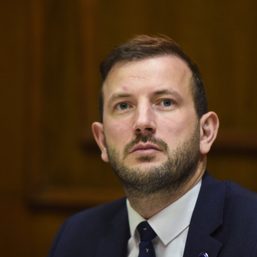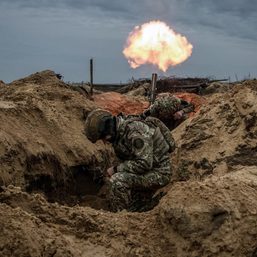SUMMARY
This is AI generated summarization, which may have errors. For context, always refer to the full article.
In defending its popular but bloody anti-drug campaign, the Duterte government directed the attention of the European Parliament to the murder convictions in one out of thousands of cases that remain unsolved.
“We likewise do not tolerate human rights violations as we have already prosecuted the killers of slain victim Kian delos Santos as well as dismissed cops proven to have committed abusive and unacceptable behavior in their line of duty,” the Department of the Interior and Local Government (DILG) said in a statement on Thursday, September 24.
The DILG is the government agency which administratively supervises the Philippine National Police (PNP), the workhorse of the Duterte administration in enforcing its landmark campaign. (LISTEN: [PODCAST] KRIMINAL: The boy named Kian)
Without citing specific examples, the DILG also added that the Duterte government is “taking great measures in ensuring that the individual rights of the Filipino people are duly respected and protected.”
The DILG was reacting to the EU Parliament calling for the United Nations to lead an independent probe into widespread killings and abuses in the Philippines under President Rodrigo Duterte.
Is it enough?
The DILG was referring to the murder conviction of 3 policemen in the August 2017 killing of 17-year-old Kian delos Santos, which sparked widespread outcry in the Philippines.
For human rights groups, the prosecution of the policemen in the case of Delos Santos is an exception to a system where killings, especially drug-related ones, are mostly left unsolved.
The Duterte government has also adjusted its anti-drug campaign after facing a Supreme Court petition questioning its constitutionality.
The new rules, implemented in early 2018, required the presence of human rights-specializing policemen and prior coordination with the Philippine Drug Enforcement Agency in all anti-drug operations.
These new rules, however, failed to stop the the rise of killings in police operations. The PNP has also not introduced any new policy to improve its crime solution rate for the killings.
The Duterte government flaunts a special task force under its Department of Justice to prove its commitment against a culture of impunity, but the track record of this 7-year-old unit leaves much to be desired.
Why does this matter?
The EU Parliament’s call adds to mounting international scrutiny and criticism on Duterte’s so-called “drug war.”
The EU Parliament said in the document that an “independent international investigation” should commit to bring to justice those behind the culture of impunity in the Philippines.
The European lawmakers also encouraged the International Criminal Court “to continue its inquiry into the allegations of crimes against humanity” in Duterte’s war on drugs.
On June 30, United Nations High Commissioner for Human Rights Michelle Bachelet spoke before the Human Rights Council and gave a damning report on Duterte’s centerpiece campaign, describing the killings as “widespread and systematic.”
International Criminal Court Prosecutor Fatou Bensouda is also set to decide this year whether or not she will open a formal investigation into killings in the Philippines. – with a report from Jodesz Gavilan/Rappler.com
Add a comment
How does this make you feel?






![[The Slingshot] Alden Delvo’s birthday](https://www.rappler.com/tachyon/2024/04/tl-alden-delvo-birthday.jpg?resize=257%2C257&crop=263px%2C0px%2C720px%2C720px)
![[EDITORIAL] Ang low-intensity warfare ni Marcos kung saan attack dog na ang First Lady](https://www.rappler.com/tachyon/2024/04/animated-liza-marcos-sara-duterte-feud-carousel.jpg?resize=257%2C257&crop=294px%2C0px%2C720px%2C720px)
![[Newsstand] Duterte vs Marcos: A rift impossible to bridge, a wound impossible to heal](https://www.rappler.com/tachyon/2024/04/duterte-marcos-rift-apr-20-2024.jpg?resize=257%2C257&crop=278px%2C0px%2C720px%2C720px)

There are no comments yet. Add your comment to start the conversation.